#Lothlann
Explore tagged Tumblr posts
Text
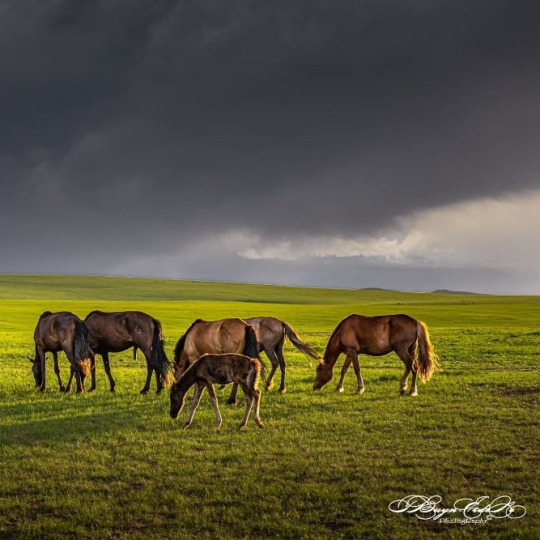

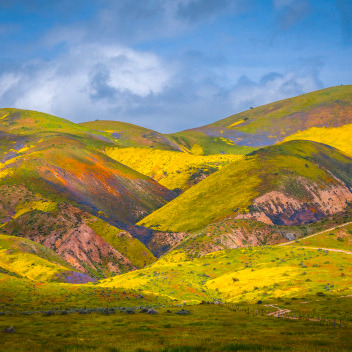

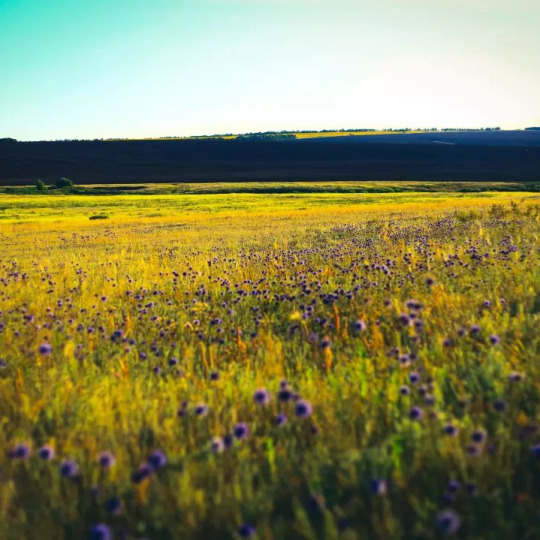
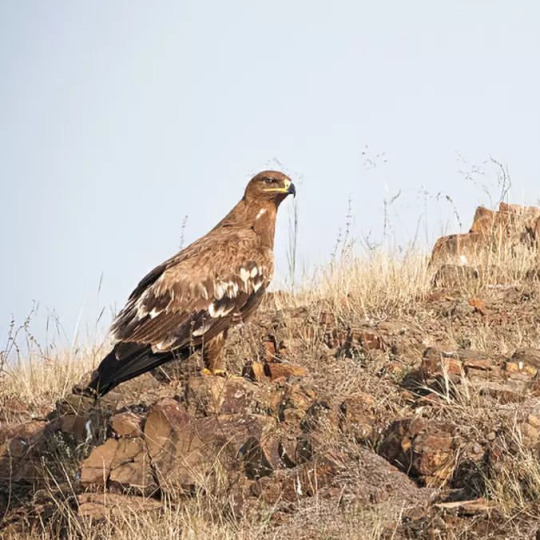
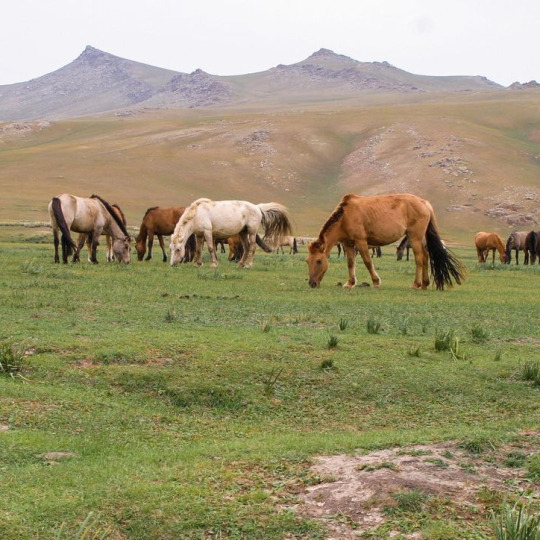


Maglor’s Gap and the plains of Lothlann
I recently completed my world building post for the birds of the Gap and Lothlann so I wanted to make a board
x x x x x x x x
112 notes
·
View notes
Text




ATLAS OF ARDA ⇢ MAGLOR'S GAP
↳ for @feanorianweek 2025 Day 2: Maglor
But they overwhelmed the riders of the people of Fëanor upon Lothlann, for Glaurung came thither, and passed through Maglor’s Gap, and destroyed all the land between the arms of Gelion.
#feanorianweek#silmedit#tolkienedit#silmarillion#maglor#litedit#oneringnet#tolkiensource#userlyndeth#tuserosie#usertilions#southfarthing#userindomiel#useraster#maglor's gap#the silmarillion#aofa*#my edit*
168 notes
·
View notes
Text


Lasbaneth of the Mithrim Sindar. Married Maglor Fëanorion to make alliance between the Houses of Fëanor and Mithrim, Lady of Lothlann, perished in the Dagor Bragollach and waits for the return of her husband in the Halls of Mandos.
#tolkien#silmedit#tolkienedit#fc: nataliya piro#i have a lot of feelings about lasbaneth as well#and a lot of stories still to write#elleth made this thing
13 notes
·
View notes
Note
Fandom asks for you : What kind of food did the elves have in Maglor's gap, what was their cuisine like? (I'm hungry right now :D)
Another ask, since I don't really have a good idea about it: what kind of home did Maglor have in Beleriand? Did he a music room or two or was the whole dwelling a music hall ?
Thank you <3
Regarding food, @melestasflight answered this best, I have nothing to add.
As with everything about Maglor, my headcanons are as unstable as the sea along which he wanders. As to where he lived geographically, much as I like him being a short journey from Himring for quick Maedhros visits, it makes more sense to me if his main abode was a small fortress at the foothills of Mt Rerir -- so closer to Caranthir than to Maedhros, which is part of the reason they were (in my headcanon) also close as siblings. This seems a more logical spot from which to govern and guard the Gap. But as a military commander I think he often travelled around where he was needed and had many homes here and there of varying grandeur, but all of them relatively modest compared to the other princes of the Noldor. Not to say he preferred modest living, it just wouldn't make sense to have a gorgeous palace in a place so vulnerable to attack.
The primary function of his dwellings was military, so they were designed with that in mind. His main fortress in the east, the largest settlement in the Gap/Lothlann, would have had a music room, and a hall for performances. That's just standard elf stuff! Gotta have a performance hall. It was a very special treat when the Lord of the Gap himself performed for the people -- which he'd often do without warning, whenever he had the time, but if it was known in advance people would travel from across the countryside to see it.
His music room was a private place, however, even from his visiting brothers. He didn't often let others in there with him, and if he did it was a sign he really respected you (and was probably DTF). He let Finrod in there.
Thank you, this was fun to share thoughts on!
20 notes
·
View notes
Text
the fairest stars: post iv
Beren and Lúthien steal two Silmarils, more sons of Fëanor than anyone ever needed or wanted get involved, things go extremely sideways: you know the drill. You can find the first 18 parts of this bullet point fic on AO3 here, and parts 16-20 on tumblr here.
We're starting out part 21 with a timeskip!
One year after the fall of Himring, north Beleriand remains bitterly contested.
The East is overrun. In Barad Eithel's great war-room the map of Estolad is covered in black arrows stretching from Lothlann down to the Andram Wall.
Caranthir and Amras maintain a last stronghold on Amon Ereb, with the people of Himring who fled there after its fall; but Ossiriand, they fear, will only remain undefiled so long as Morgoth's attention does not turn towards it.
Their Eastern allies, too, are unimpressed. Bór and his young sons were all slain not long after Himring burned; the few of their people who escaped the orc-raids have joined themselves to Ulfang in Thargelion, but they are none too friendly to the Fëanorians these days.
"And Nelyo says I'm bad at making allies," Caranthir remarks.
[yeah he's in this now. damn it why will they not stay in their place.]
"I wouldn't say this is Nelyo's fault," Amras says quietly.
It is a debate held, in one form or the other, in every free kingdom in Beleriand.
But anyway, the East does not seem to be Morgoth's main concern for now.
It is Hithlum, Fingon is sure, where the next assault will come.
Hithlum, the realm of the High King of the Noldor; Hithlum, where he reigns who once humilated Morgoth so thoroughly; Hithlum, where Maedhros holds a Silmaril yet.
If the last true stronghold of the Noldor falls—
And he is facing plenty of internal pressure, too.
His lords – many of them survivors of the Grinding Ice, and arch-loyal followers of the House of Fingolfin – are less than impressed by the rumours that have reached them of the fall of Himring, and Maedhros' actions there.
Fingon has tried to quell the whispers as best as he can. But it is impossible to deny the fact that the attack took Himring by surprise because its patrols were cancelled on Maedhros' orders, or that Maedhros left the field as their position worsened.
The healers who treated Maglor's stab wound have not been quiet, either, about the fact that it was an elvish blade that caused the injury.
And some of those who were at Himring have heard that Maglor was found in a pool of his own blood with Maedhros, subdued too late, unconscious beside him—
If only they knew, Fingon thinks furiously, they would not cast sly aspersions on his judgement and his taste in friends. They would not stop talking of anything consequential when Maedhros drew near, as if he is not to be trusted with the secrets of the war.
Of course when he dares to suggest to Maedhros that this might bother him, Maedhros laughs and says, "Finno, do you think this the worst humiliation I have ever endured?"
So. There's not much Fingon can say to that.
His father was a diplomat, a politician, a builder of alliances. Fingon is not doing a very good job of living up to that legacy.
Thingol returned no response to the letter Fingon sent him, informing him of Curufin's disappearance.
In fact, Thingol is kind of just Done.
So the Noldor turned out to be faithless. What else is new?
Also he didn't really want Curufin's head anyway. Where would he even put it?
Fingon cannot give him what he truly wishes for: his daughter.
In Lúthien's absence old age has fallen upon him, who has lived unwithered for long Ages of the Stars since his birth at distant Cuiviénen.
Melian sings no longer. The people of Doriath, who have known little but peace and splendour since the Girdle was first raised, begin to wonder if their blessings have been withdrawn.
So it is a Menegroth much changed into which Beren and Lúthien walk, hand in hand, one afternoon.
Their return is met with both joy and some consternation. Youth comes back to Thingol at the touch of his daughter's hand; but Melian knows that she will never smile again.
Lúthien bears it all, the feasts of celebration at which none can look her in the eye, her father's overwhelming gladness and her mother's sorrow, the halls that ring yet with the memory of her grief, for exactly two weeks; then she announces that she and Beren are leaving.
"Daughter," Thingol protests, "you have only just returned to us – and soon—"
(Thingol does not know how he will ever handle the parting that is to come.)
"Will you not stay?" he asks. "This is your home."
Lúthien is not sure she knows what home means any more.
"I am sorry," she says, regretful but firm.
The next day finds her and Beren walking through Brethil, debating their next course of action – just as they did not so very long ago, when Celegorm and Curufin attacked them in the woods.
It is of that little skirmish that Beren is thinking now.
"They say Curufin is still out there somewhere," he argues. "It mightn't be safe—"
"I sang Morgoth himself to sleep," Lúthien cries, "and you think I can't take Curufin Fëanorion?"
"Tinúviel," Beren says, with a laugh, "I do not think there is anyone you can't take."
Lúthien allows herself to be placated.
"I am not suggesting we dwell alone in the wilderness," she says; "you made your earlier thoughts on that very clear. But I – I cannot go back to being Doriath's Princess, Beren, as if every part of me is not changed irretrievably since first you called my name, as if – as if you didn't die there, and—"
"Sweetheart," says Beren, kissing her forehead. "It wasn't permanent." And when she chokes out a little laugh through her tears, he goes on, "I know you do not wish to stay in Doriath. But we must choose somewhere – and somewhere safe. It seems as though the Enemy's reach has lengthened in the time we were, um, gone."
"I thought to go to Ossiriand," Lúthien says. "My kin the Green-elves still guard those lands."
"But only those lands," says Beren. "Estolad and Thargelion are overrun. The sons of Fëanor keep no watch upon the Eastmarch. If Morgoth were to learn that you dwelled there—"
"I'm not afraid," Lúthien says. "And even if I were – am I never to venture beyond the Girdle again, for fear of him? Is all my father's kingdom to be naught to me but a prison, as Hírilorn was? I cannot stand it – I will not."
Beren takes both her hands in his one and looks at her. "Tinúviel," he says, very seriously, "I will never cage you."
Oh, he knows her. What a wondrous, terrifying thing, to be understood so completely.
Perhaps Lúthien is still a little delirious with the rush of living once more, for she dips her head to capture Beren's mouth in a delighted kiss, and for a time they both forget all other matters.
Plucking strands of grass from her hair some time later, Beren says, "I have another idea."
"What! I thought I argued my case quite passionately," Lúthien teases.
"You said you thought of dwelling among your kin," says Beren. "What of going to mine, instead?" And, when Lúthien shoots him a puzzled look, "The House of Bëor is mostly ruined, but there are still remnants of my people who escaped Dorthonion ere its fall. Some of them dwell nearby, with the Haladin. And others went north to Dor-lómin – my little cousin Morwen is the lady of that land now."
"I do not wish to stay in Brethil," says Lúthien; "it is rather too close to Menegroth for my tastes. But the Land of Echoes, on the other hand..."
Her eyes are alight with that same fanciful gleam they used to get when Beren told her stories of the world outside the Girdle, of holy Tarn Aeluin and the dread Ered Gorgoroth alike.
You would think, Beren muses, that she would have had enough of adventure by now.
"I have," says Lúthien, catching his thought. "We are to live a very peaceful and retiring life. I insist on it! That is what I told Mandos we deserved. None shall dare assail us, in Dor-lómin." She rolls the name on her tongue as if trying to taste it.
"They call it so because of the terrible cry of Morgoth when Ungoliant assailed him," Beren tells her, "not for any sweeter music."
Lúthien laughs and flings her arms around him. Oh, his living body warm and solid against hers! It is a gift she does not intend to waste.
"Luckily," she says, "I am good at changing the melody."
Another conversation between lovers:
"Do you think it could be done?"
“I have already told you what I think.”
"But you haven't explained," Fingon persists, "you have only looked at me dolefully and proclaimed that it is not possible."
"Well, it is not," says Maedhros. He is lying curled in Fingon's arms, their ankles hooked together, and he is loath to disturb their contentment with arguing. Keeping his voice measured, he says, "If our strength were doubled I do not think it would be enough, Finno."
"The attack will come either way," Fingon says, also without much vigour. They have had this debate so many times now that it is become well-worn. "Why not meet it head on?"
"Because you have a defensible position here," Maedhros says patiently, "and a greater chance of holding than you do of storming the gates of Angband."
"My father did it," Fingon mutters.
"Your father died," Maedhros says, voice suddenly sharp.
Fingon looks at him. "Don't look so worried, beloved! I am quite turned off the idea of wasteful heroics these days."
"Then look to strengthening your defences," Maedhros says, "and drop this fool notion."
"But if we did try," says Fingon, "if we united all the Free Peoples under one banner, and marched on Angband together – think what we could achieve!"
His eyes are bright with hope. Maedhros hates to crush it, but crush it he must.
"Finno," he says, "the East is lost. My brothers do not have so strong a position in Amon Ereb that they can afford to march north to join in a war that could prove ruinous. Bór and his people are dead almost to a man. Belegost will no doubt have heard the rumours—"
Fingon glances at him sharply, but he speaks without bitterness. Which is concerning in itself, but Fingon decides to let it slide for now.
"—and there is little help to be expected from other corners," Maedhros continues. "Doriath has strength to spare, but Thingol hates you."
Fingon shifts uncomfortably. He never actually told Maedhros why Thingol hates him now.
"Nargothrond," he says, to change the subject. "Orodreth will answer to his High King."
"Orodreth!" says Maedhros, dismissively. “A king too ruled by the whims of his people. If he had any spine he would have turned my brothers out of Nargothrond immediately, and Finrod might have lived.”
If Fingon were crueller he might say, You didn't manage to control your brothers that well yourself. Instead he says, "But the people of Nargothrond are many and valiant. We should not discount them."
"If Nargothrond wishes to stay out of the wars of the north," says Maedhros, "I think it would be prudent to allow them to do so." There is a thoughtful, uneasy look in his grey eyes.
Fingon gauges it correctly and says, "Are you worried for your nephew?"
Maedhros looks at him unhappily. "Everyone in Beleriand knows what a mess – Curvo – made of – everything," he says.
(A year might have passed, but Maedhros still does not much like to speak of Curufin.)
"Tyelpë is safe in Nargothrond, where his father's deeds cannot taint him," Maedhros says. "I would keep him so." Then he shrugs. "But my opinion carries no weight now, beloved. Do as you will, and I will support you, for all that is worth."
"It carries weight with me," Fingon says fiercely. "And I am not ashamed to say so. But you have not yet heard the key element in my plan."
Maedhros smiles despite himself, propping himself up on his elbows so that he can keep his eyes focused on Fingon's face. The mass of his silken hair is pooled on Fingon's bare chest. "Go on, then," he says, indulgent.
"Gondolin," Fingon says triumphantly. "My brother took a third of our host with him when he disappeared, and yet more of the Sindar went with him. They have lived in peace for more than three hundred years; their numbers must be great."
Maedhros does not seem as delighted with this idea as Fingon is. "Finno, you don't know where Gondolin is."
"The Eagles bring them tidings, clearly," Fingon points out; "else they would have opened the leaguer and come to our aid when they saw the fires of the Dagor Bragollach on the horizon."
Maedhros frowns, attempting to parse this extremely backwards logic. Eventually, he says, "If Hithlum falls, Gondolin will be the last stronghold of the Noldor in the north. I do not know if its position should be risked."
"All war is risk, beloved," says Fingon, "and if I were to call upon my brother, Hithlum will not fall."
Maedhros says, as if he has been saving this blow for last, "Finno, if you call upon Turgon, will he even answer?"
It has been more than three hundred years, since Fingon last saw his brother.
“Do you think he won’t?” he asks, more sharply than he means to.
(Turgon didn’t tell him he was going. He didn’t tell anyone. He just – vanished.)
Sometimes Maedhros thinks things were easier during Maglor’s long convalescence, when his only concern was his brother, when every sleepless night was because Maglor needed someone to sit up with him and every meal was whatever invalid's food Maglor could be persuaded to choke down – when Fingon was his strength and steadiness, and Maedhros could yet wrap his blue cloak around him like armour.
Selfish – selfish. Maglor is better now, and Maedhros is so, so glad; and Fingon cannot always be his strength. Sometimes Maedhros must be his.
"I am sure he will," he says, contrite. He presses a kiss to Fingon's tense jawline. "I just don't think it wise to ask him."
Fingon sighs and puts his arms around Maedhros. "Fine," he concedes. "Perhaps you are right."
But later, when they have extricated themselves from their warm tangle of limbs and risen for the day, he sits down to write a letter.
A few days later the High King's messenger, having ridden swiftly along the Ered Wethrin and into Dor-lómin, nearly collides with a small child playing near the road.
"Be careful!" cries Lúthien, dropping Beren's hand and rushing forward to snatch the child up.
The messenger gapes at her, for it seems to him as though she has materialised out of the shadows themselves. Then, when he gets better look at her beauty, he gapes even more.
Lúthien is not paying attention. All her focus is on the little golden-haired creature in her arms. "That was nearly very dangerous for you, wasn't it, sweetheart?" she coos. "But you don't seem frightened at all. What's your name, dear one?"
The little girl giggles and hides her face in Lúthien's sleeve without answering.
Beren feels a little dizzy, looking at the picture that they make, and at the bright tender look on his wife's face. Someday, he tells himself, someday.
He looks around. The messenger has dismounted; it seems the great house up ahead is his destination. A house of lords, clearly, surrounded by gardens as lovely as any in the chilly northlands, and with a bubbling stream running just past its walls.
Well, here they are.
He is pondering what the etiquette is here – should they knock? wait here until someone spots them? – when he catches sight of a second child, a little older, dark-haired, watching them intently from around a tree-trunk.
"Good day, lad," Beren says gravely. "Might I ask your name, and those of your parents?"
The boy regards him with suspicion for a while, before he finally says, "I am Túrin son of Húrin, and that is my sister Lalaith."
(One little-appreciated consequence of the fall of Himring: for the last year, Morgoth's attention has been on the final desecration of the March of Maedhros. He did not have time to send the Evil Breath to Dor-lómin.)
"Lalaith!" Lúthien says, delighted. "What a fitting name."
"Then, son of Húrin," says Beren, "we have reached our destination indeed. Might you do me the honour of introducing us to your parents?"
Túrin looks unimpressed. "Who are you?" he asks.
"My name is Beren son of Barahir," says Beren, "and we are kinsmen, son of Morwen."
Túrin frowns even more. "How do you know my mother's name?" he demands. "And Beren is dead."
Kind of hard to argue with that.
Before Beren can come up with a suitable response there is a small noise from the direction of the house: the children's mother has come out to call them in for the evening meal. She stands so still she might be made of stone, were it not for the wind whipping up her dark hair behind her.
Beren finds his own mouth is very dry.
He buried Baragund his cousin, and avenged him; and he has not thought of his slaughtered companions for a long time.
(There's only so much survivor's guilt one person can have, and it is usually the screams of Finrod and his Ten that haunt Beren's nightmares.)
Morwen is not now the thirteen-year-old he remembers, her face sterner and more sorrowful, but somehow she is the image of her dead father.
"Hello, little cousin," he croaks out.
Morwen stares at him.
Lúthien comes to the rescue. "You must be the lady Morwen," she says warmly, setting Lalaith down so that she can drop into a graceful curtsey. Her Taliska is hesitant, but beautiful. (Everything about Lúthien is beautiful.) "Beren has told me so much of you. And your children are charming."
"Beren's dead," Morwen says at last, shakily. "And – you—"
"I was dead," says Beren, "but now I'm not. I don't know how to explain it, cousin, but—" He holds his hand out to her, letting the Ring of Barahir gleam green upon his finger in the setting sun. "It really is me."
Morwen makes another small sound, swaying where she stands. Her hand rests on her son's dark head as though he is the only thing keeping her upright.
"Mother?" Túrin says nervously.
Before things can get any more awkward the lord of the house comes out to seek his family, perhaps wondering what is taking them so long. "Morwen," he says quietly, seeing her stiff posture.
But Morwen takes a breath. "We have guests, Húrin," she says, composed again. "This is my kinsman Beren Erchamion, and his – and his wife, the Princess of Doriath."
Lúthien turns her dazzling smile on Húrin. "A pleasure to meet you," she says gaily. "But call me rather the Lady of Dorthonion."
(to be continued)
#silmarillion#my fic#bullet point fic#the fairest stars#beren#luthien#fingon#maedhros#russingon#here we gooo!!#very excited for where we're going with this arc#this thing definitely needs more editing but I lost patience so have it now#say hi to a bunch of new characters (more are coming later too)#and a new set of political problems#also guess who DOESN'T appear here for the first time in 21 parts I'm as shocked as you are#(he'll be back next time dw)#also nobody died or got stabbed or had a breakdown or got nearly executed or like. even stubbed their toe here so BE GRATEFUL
241 notes
·
View notes
Note
That sauron x galadriel x celeborn post is delectable. I'm curious how celeborn would perceive it, were he to see the moment in a fourth wall kind of way. Also, will this threesome dynamic always be like this? Something reminds her of Him -> she knows he's watching -> she taunts him with her husband -> celeborn is pleased? It seems like more of a third wheel angle, so I'm curious to see how you write the haladriel aspect :>
Oh I have so many thoughts on this one! And so many different angles it could go, depending on the day's preferred flavour of "and how is that working exactly" re: 3rd-Age and post-3rd Age canon Celeborn and Galadriel if you put a past Haladriel story in there.
As angst: the most beautiful and gorgeous take on this I have ever read is in @bad-surprise's fic and this part was for her, this part was for her (does she remember?) , which I love so very much:
She furrows her brow in one gentle crease, and she is so beautiful he forgets that he’s prepared a speech— it was so easy to dream up a response outside of the moment, considering hypothetical feelings like abstract concepts, but now he is seized by the ferocity of it, the violent tide of emotion threatens to drag him under, body weighed down by his anger and his love and this prescient, pre-emptive grief— The world is changing, she whispers into his soul, too close, far too close for comfort, and he did not agree to this.
As more lighthearted: so in LOTR the hobbits are told that Galadriel is constantly mind-battling with Sauron, which is fine as far as it goes but surely she needs some time off sometimes over thousands of years, right?, so I like the idea of Celeborn standing in sometimes as her out-of-office contact. This is from an unfinished ficlet of mine:
The Enemy’s voice, which is a whisper and a howl and a flap of wings all wrapped into one hissing, singing tone, says: Galadriel. “She isn’t here,” Celeborn says. Bring her. Celeborn turns over a page in his book. It’s a history of the land that was once Lothlann, in the north of Beleriand, and the Sindar who once dwelt there. It’s not badly written but he does rather think it’s a lot of Noldor self-justification, mixed with far too little of anything interesting. “She’s busy.”
As slightly unexpected resolution: so I joked on Twitter at one point that I don't really care about 'endgame' in ships but if we're going down that road then out of Sauron, Galadriel, and Celeborn, only two of those stay in Middle-earth after LOTR. And then I thought "well you know what, they'd both miss her, maybe they should get to find some comfort in that together." And so I wrote it:
The air lifts a sigh between them. Illusion, surely; and yet Celeborn senses it on his skin all the same. “Such arrogance to think you can name anything I feel, silver Sinda princeling. I thought the elves were all to fade away and become formless ghosts among your trees. Is that what’s happening to you? Is that how you can speak with me this way?” It’s that or it’s the Mirror or it’s something else, something about the land, something about the one who once loved it. He does not care. If he closes his eyes, he can feel the other’s touch on his face as warm as a living hand.
#asks#fic recs#haladriel#sauron x galadriel x celeborn#sauron x celeborn#rings of power#love triangles have three sides#eyeofacat fic
12 notes
·
View notes
Text
I Read The Silmarillion So You Don't Have To, Part Six
Previous part.
Chapter 14: Of Beleriand and its Realms In which we get a geography lesson.
Had enough political geography yet? I’m not going to summarize this whole chapter, because it’s exactly what it says on the tin: it describes the realms of Beleriand. It is impossible to make sense of this chapter without looking at the map. And most of it is information that we already know. For the sake of being complete, and of helping myself keep track of all this information, here’s what’s important:
The northern land where the Noldor live is called Hísilomé (in Quenya) or Hithlum (in Sindarin), both of which mean “Land of Mist.” It’s called that because of all the smoke that comes from Angband blows over it. It’s co-ruled by Fingolfin and his son Fingon.
In the westernmost part of Beleriand, on the coast, is a land called Nevrast. Turgon, Fingolfin’s other son, rules there. It’s completely surrounded by mountains in a kind of triangular shape, which is not how mountains work. Its population consists of an even mix of Noldor and Sindar.
Remember how I said there were two Minas Tiriths? The one we know is the second one, in Gondor, many thousands of years later. The first one is a watchtower built in a small mountain pass on the River Sirion, here in Beleriand. Finrod built it, but he leaves it in the care of his brother Orodreth. (“Minas Tirith” just means “guard tower” in Sindarin, so that’s why there’s two fortresses with that name.)
The River Sirion flows south. West of it is the realm of Nargothrond, ruled by Finrod, and east of it is Doriath, the forest ruled by King Thingol of the Sindar.
The eagles live on a chain of mountains called the Crissaegrim. (Yes, the name of the best sword in Castlevania: Symphony of the Night is a reference to this! )
In the eastern part of Beleriand is the River Gelion, running parallel to the Sirion. It has six rivers that flow into it. That land is called Ossiriand, and the Green Elves live there. Directly north is Thargelion, where Caranthir (another one of Fëanor’s sons) has his castle.
In the northeast is Lothlann, which is the plain that’s most exposed to Morgoth. Maedhros has his castle there.
I feel like this chapter should have come before the last one. It describes a bunch of places which have already been referenced in relation to each other. So, why are they being described now, after they’ve already become relevant to the story? Like, for example, the Thangorodrim. In this chapter, we’re told that the Thangorodrim are mountains made out of the refuse from Morgoth’s excavations while he was building his fortress. That would have been nice to know before M��dhros was nailed to the face of them. Back in the last chapter, the text just sort of assumed that we already know what the Thangorodrim are. I gathered from the context that they’re mountains and that they’re connected to Morgoth. I guess that’s all one really needs to know, right? No story actually needs this detailed a description of the geography… but this book is 300 pages of straight infodumping. So, we get all the geography, and out-of-order.
Okay, now that that’s over, let’s move on to something interesting!
Chapter 15: Of the Noldor in Beleriand In which a legendary city is built, and Thingol hears all the dirt on the Noldor.
Remember Turgon? He’s Fingolfin’s son and Fingon’s brother, and he received a prophetic dream from Ulmo, the Vala of Water. The dream led him to finding a hidden valley in the north of Beleriand. Feeling homesick for Valinor, Turgon decided to build a city on the hill in the center of the valley, which would be like a New Tirion — the original city of the Noldor, replicated in Middle Earth!
Turgon brought many of the most skilled Noldor to the valley to build the city, and then ditched them to live comfortably in Nevrast while they did the work for him. After fifty-two years, the city was complete. Turgon named it Ondolindë, which means “The Rock of the Music of Water” in Quenya. But it’s better known by its Sindarin name, Gondolin.
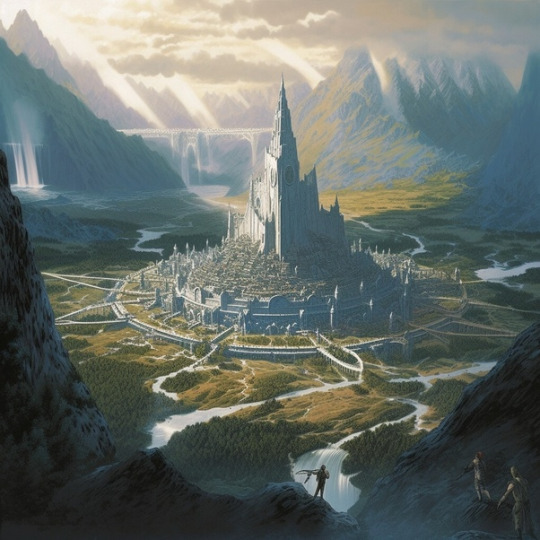
The Hidden City of Gondolin by Aesthetica
Gondonlin is the Elven City (which is why it’s kind of surprising to learn that it’s a copy of an even greater one). It’s gorgeous and bright white, with beautiful fountains and gardens. The giant tower in the middle is Turgon’s palace, and in it he creates images of the Two Trees of Valinor, wrought out of literal silver and gold; the gold one is called Glingal, and the silver one is called Belthil.
The most wondrous treasure of Gondolin is, of course, Turgon’s beautiful daughter Idril Celebrindal. Like Galadriel, she almost has the light of the Gold Tree, Laurelin, in her hair. So, that makes her one of the prettiest Elves alive.
Ulmo promises to protect Gondolin, and ensure that no one will ever be able to find it against his will. But he straight-up tells Turgon not to get too attached to Gondolin. (Actually, he says “the work of thy hands” — lol, Turgon did nothing to help build it.) Ulmo also tells Turgon that his little safe-haven isn’t going to protect him from the Curse, so, he can expect treachery within Gondolin’s walls at some point. The only hope is going to be someone who comes from the west.
What Could Possibly Go Wrong?
A third of the Noldor and even more of the Sindar pass secretly into Gondolin, apparently disappearing overnight. (Nevrast is completely abandoned) Then the gates are shut.
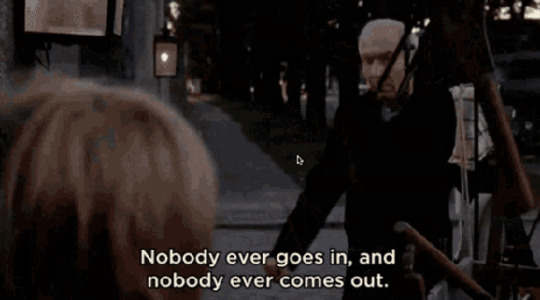
Meanwhile, Galadriel is enjoying her life in the court of Thingol. Remember, she’s one of the only Noldor Elves who’s allowed to be there, past the magic wall. She has long talks with Queen Melian, the Maia, about Valinor. But Galadriel refuses to say anything about how and why the Two Trees died. Melian can tell that something’s wrong, and asks Galadriel what happened. Galadriel says that she wants to put the past behind her, and try to have some hope for the future.
Melian presses her — she knows better than to think, as everyone else does, that the Noldor were sent by the Valar to swoop in and save her people from being assaulted by Orcs. She notes that the Noldor don’t speak of the Valar at all; they just sort of pretend that the Valar don’t exist. From that, she concludes that the Noldor aren’t messengers, they’re exiles. Something went badly wrong.
Galadriel caves, and tells Melian about the Silmarils, about how Morgoth stole them, about the death of Finwë, and about how the Noldor left Valinor willingly despite the Valar not wanting them to leave. She neglects to mention any of the worse stuff, like the Oath that Fëanor’s sons took, or the kinslaying, or the Curse, or the burning of the ships. Melian senses that she’s still holding back information. She doesn’t press Galadriel any more, but she does tell her husband Thingol about the Silmarils.
Only Melian is really able to put two and two together, and realize just what a big-ass deal the Silmarils really are. They contain the last remaining Light of Valinor, and if Morgoth has them, then any attempt at recovering them is almost inherently pointless. It’s going to take far more power than Elves have to take the fight to him. Fëanor tried that, and now he’s dead, even though he was one of the greatest Elves. If anyone else tries to take on Morgoth, they could risk destroying the world in the process. For better or worse, the fate of Arda is tied up with that of the Silmarils.
Thingol is distraught to hear that Finwë is dead, and figures he was right not to trust the Noldor. The only silver lining is that at least the Noldor will make good allies against Morgoth, because peace with him doesn’t seem to be an option. Melian tells him to be wary of Fëanor’s sons. She could read between the lines and figure out what Galadriel wasn’t telling her. Fëanor’s sons are all guilty of crimes against the Valar, their own families, and even themselves. There’s a lot of unresolved tension between them that’s only dormant for the time being, and it can only get worse from here. Thingol dismisses her concerns. All he cares about is that Fëanor’s sons will give him his best shot at taking down Morgoth. Whatever drama is between them is their business.
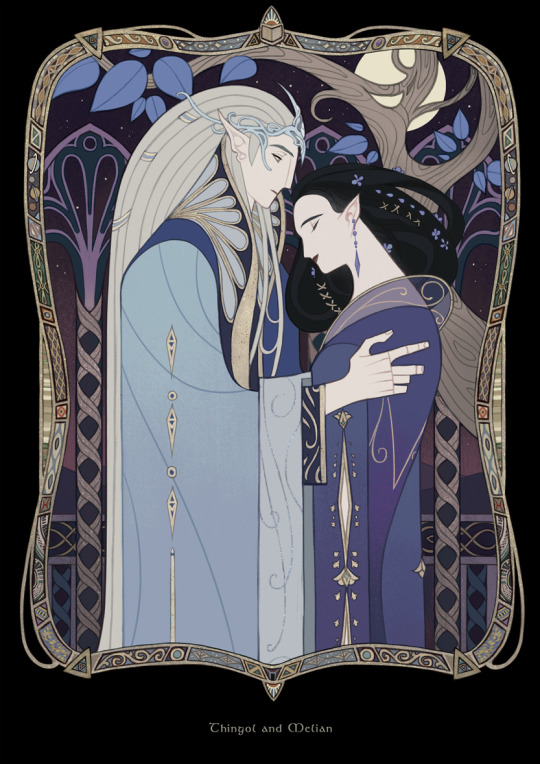
By Wavesheep
Melian and Thingol decide not to speak of this again, but rumor spreads amongst the Sindar about what the Noldor did to get kicked out of Valinor. Many of these rumors are spread by Morgoth. Spreading rumors was how he set the Noldor on their dark path in the first place, and the Sindar were too naïve to know not to believe rumors. Círdan, however, catches wise. He perceives that the rumors are being spread maliciously, but doesn’t think to blame Morgoth. He assumes that the Noldorin princes are spreading rumors to slander each other. He sends messengers to Thingol to tell him about the rumors.
By pure bad luck, Finrod and his brothers happen to be there in Thingol’s court, visiting their sister Galadriel. So, Thingol hears all the rumors while they’re there. He explodes at Finrod for having lied by omission. Finrod protests that he’s never done anything to Thingol, nor have any of the other Noldor. Thingol cooly responds that all the Noldor have blood on their hands for kinslaying, but they don’t try to defend themselves or seek pardon. Finrod has nothing to say to that.
But Angrod, his brother, speaks up. Angrod blames Fëanor for the whole thing. The other Noldor are really the victims in this situation, he claims, because they were intoxicated by Fëanor’s words, and then Fëanor abandoned them to freeze to death. The reason why Thingol hasn’t heard any of this before is because it’s an act of treason against the Noldor to talk about it. Surely, Thingol can understand that?
Melian is less than impressed. She points out that, according to Angrod’s own account, Mandos doomed all the Noldor. That means that he and his siblings are just as damned as the rest of them. They're all affected by the Curse.
Thingol is silent for a moment. Then he tells Angrod and co. to get out of his house. He’s not going to shut them out forever, because they’re family. He’s also going to maintain his friendship with Fingolfin’s people, because he needs them to take down Morgoth. But, he refuses to hear their language be spoken in his presence, and he commands that none of the Sindar use it, either. Anyone who speaks Quenya will be branded a kinslayer.
So, now you know why Sindarin is the dominant Elven language in Middle-earth.
That sort of puts a damper on Quenya; it seems like such a magical and elevated language, but now it’s associated with the Noldor’s crimes. I suppose that makes sense, if the Noldor are the ones who primarily speak it. But it also seems a bit draconian for Thingol to consider someone guilty of a serious crime just for speaking Quenya.
Quenya therefore ceases to be a spoken language, and becomes mainly used for writing lore or singing old songs. It’s the Elvish version of Latin.
After that, things become a little awkward for Galadriel in Thingol’s court, so she leaves it and comes to live with her brother Finrod in Nargothrond. She asks him why he hasn’t taken a wife yet. Finrod gets a flash of premonition, and tells her that nothing of his realm will remain to be inherited by a son. But the real truth is that he left his true love, Amarië, in Valinor.
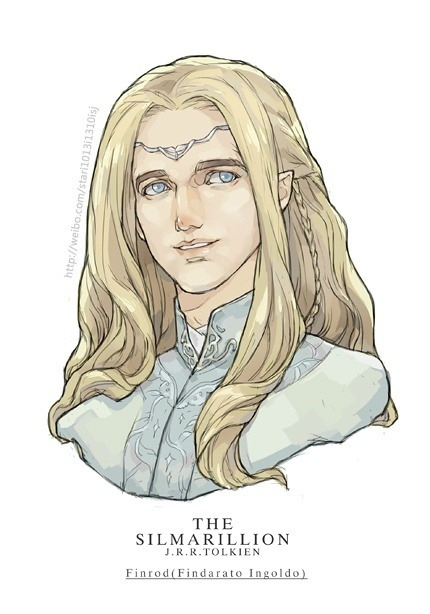
Finrod by _star热爱生活呀巴扎嘿
Chapter 16: Of Maeglin In which we meet an edgy bad-boy Elf.
Did you remember that Fingolfin had a daughter? It’s okay, I didn’t either. Her name is Aredhel Ar-Feiniel, and she’s known as the White Lady. She lives with Turgon, her brother, in Nevrast. She follows him to Gondolin, but she doesn’t really like it there. She prefers to wander freely in forests or ride horses in the fields, and she can’t do that if she’s effectively imprisoned by mountains and high walls on all sides.
Two hundred years pass (which I’m guessing is like twenty in elf years), and she finally asks Turgon if she can leave. Turgon doesn’t want her to leave. If anyone leaves Gondolin, then that risks revealing its existence to everyone else in the world, and that would be bad. Eventually he gives in, but tells her that she’s only allowed to meet with Fingon, their brother. Aredhel takes offense at this. She’s Turgon’s sister, not his lackey, and he has no right to tell her where to go or what to do. She leaves, and Turgon tells three of his lords to go with her to protect her, with the condition that they come straight back.
Aredhel immediately decides not to go see Fingon. She wants to find the sons of Fëanor (Maedhros, Caranthir, and co.), because they’re her friends. She tries to cut through the forest of Doriath, but the Sindar turn her away, because Thingol hates the Noldor now. She has to go around the long way. That way is dangerous, and polluted with poisonous water and evil creatures left behind by Morgoth and Ungoliant. Aredhel gets lost, and her escorts barely escape with their lives. They make it back to Gondolin, but have to give the terrible news to Turgon that they lost their charge along the way.
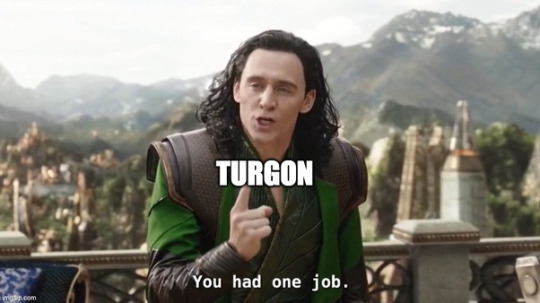
Turgon is grief-stricken and very, very frustrated. Aredhel survives, though, and ends up in Himlad, the land of Fëanor’s sons Celegorm and Curufin. They’re away, traveling further east with their brother Caranthir, but Aredhel is welcomed by Celegorm’s people.
Aredhel enjoys herself for a while, wandering in the forests like she used to, but a year passes and Celegorm still hasn’t come back. She starts wandering further and further, until she ends up in a small forest on the eastern edge of Doriath.
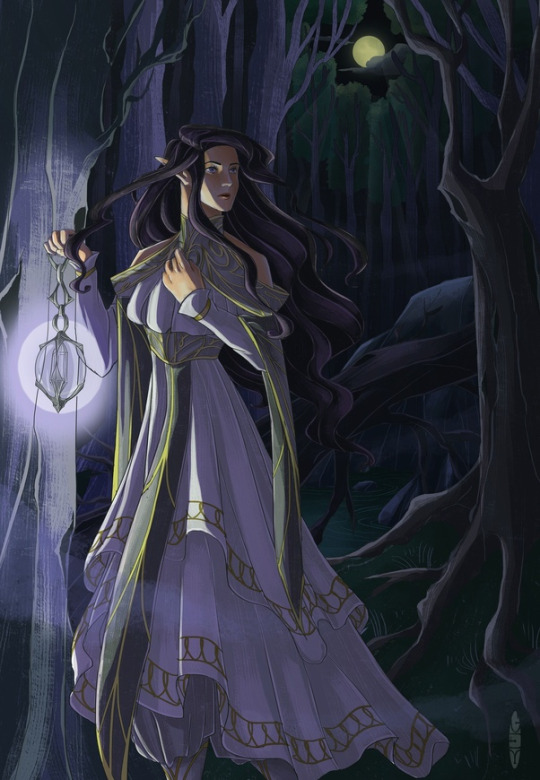
Aredhel lost in the dark forest by @gemennair
This forest is the darkest of all the forests in Beleriand, and it’s inhabited by an elf called Eöl, known as the Dark Elf. Eöl isn’t actually a Dark Elf (Moriquendi); he’s one of the Sindar, but he left Doriath when the magic wall went up. Now he’s basically nocturnal. He blames the Noldor for the return of Morgoth. He mostly doesn’t interact with other Elves, but he does like Dwarves, and gives them information about the Elves when they ask. The Dwarves taught him metalwork in exchange, and he designed a special kind of armor that’s thin and light and yet repels all weapons. It’s jet black, and he wears it all the time.
Skulking in the shadows, Eöl sees Aredhel enter his forest, and he lusts after her. He enchants the forest so that she can’t find her way out, and the forest always turns her towards the center. (Kind of like the Old Forest does to the Hobbits while they’re trying to pass through it in Fellowship.) When she finally arrives at Eöl’s house, tired from wandering, he welcomes her in. And that was the last her family heard of her for a long time.
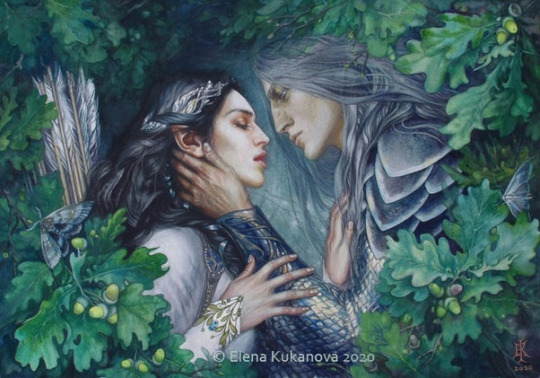
Aredhel and Eöl by Elena Kukanova
It’s unknown exactly how Aredhel responded to Eöl’s intent to marry her. Maybe she fell in love with this edgy bad-boy elf in his spooky forest. But she landed in kind of the same situation that she was in back in Gondolin. Eöl lets her wander, at least, but only at night. He also forbids her from seeking out the other Noldor, and the sons of Fëanor in particular, which is what she wanted to do in the first place. Honestly, their relationship reminds me superficially of Hades and Persephone.
Eöl and Aredhel have a son. Secretly, Aredhel gives him a name in her forbidden native tongue of Quenya — Lómion, which means “Child of the Twilight.” Eöl doesn’t give him a name until he turns twelve, and that name is Maeglin, which means “sharp glance.” Maeglin grows up to resemble the Noldor, but he is more like his father in temperament.
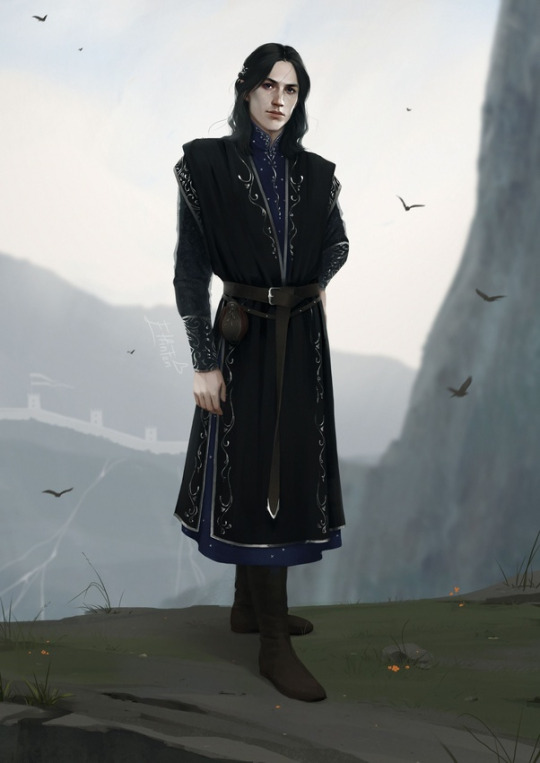
Maeglin by @elfinfen
His father takes him to meet the Dwarves, who teach him mining, smithing, and metalwork. But Maeglin has a special relationship with his mother, and enjoys hearing her tales of Valinor and the House of Fingolfin. He especially likes hearing about Turgon and Gondolin.
In telling all these stories, Aredhel realizes just how much she misses Gondonlin. She wonders how she could have left in the first place. After such a long time in the dark shadows of the forest, the bright walls and fountains of Gondonlin seem lovely. But she refuses to tell Maeglin where Gondolin is, because that is such an important secret.
Eöl is also mad that Maeglin wants to meet his Noldor relatives. He’s an old enough Sinda to still identify himself as a member of the Teleri, and therefore, he thinks of his distant relatives in Valinor as his own people. He forbids Maeglin from seeking out the Noldor for the same reason that King Thingol banned Quenya — he takes the Noldor’s crime of kinslaying personally. (He probably should have thought of that before deciding to marry Aredhel, but whatever.) Maeglin, like any edgy teenager, does not take this well. He stops going to visit the Dwarves with his father, and Eöl starts to distrust his own son.
One summer, when Eöl is gone on one of his visits to the Dwarves, Maeglin suggests to his mother that they go to Gondolin. What’s the point of sticking around? She wants to see her people again, and Maeglin has learned all he can from Eöl. There’s no sense in remaining trapped in a dark forest with nothing else to do. So, they up and leave.
When Eöl gets back, he is furious to find them gone. Despite his hatred of the sun, he chases after them, but he’s waylaid by Curufin, one of Fëanor’s sons. Curufin asks what he’s doing there. Eöl lies, saying that his wife and son were on a casual visit to their relatives, and that it only makes sense that he should be with them. Curufin sees right through him, and tells him that they’re already gone. He gives Eöl permission to pass through, but tells him that the sooner he leaves, the better.
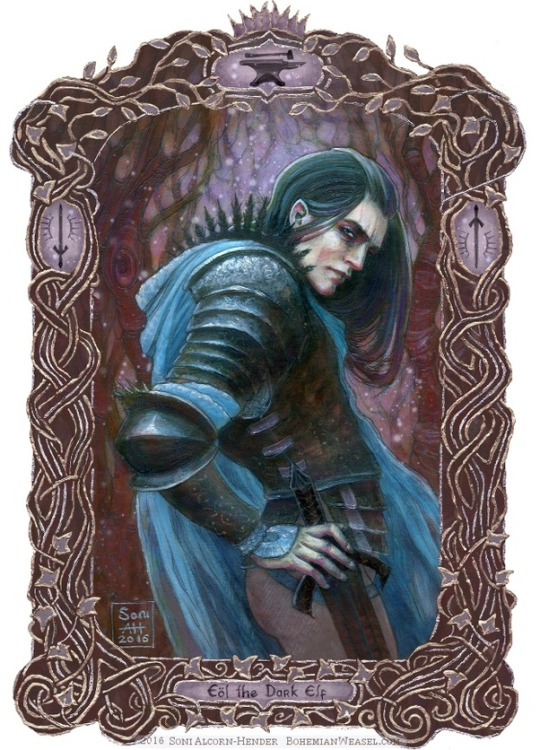
Eöl by @bohemianweasel
Eöl snipes that this isn’t the proper way to treat a kinsman. Curufin replies that it’s pretty rich for Eöl to ride upon his wife’s title when he’s been keeping her imprisoned in a forest for decades. If he wants the honor due to a kinsman, he should have acted like one. Curufin also gives Eöl a warning: He should return to his forest now. If he pursues his family, he’ll never come back.
If Eöl hated the Noldor before, now he really hates the Noldor.
As you probably guessed, he decides to chase after his family, and he eventually catches up with them just as they’re about to enter Gondolin. Gondolin, the secret city that no one is supposed to know the entrance to.
You can imagine how Turgon must have reacted when he sees his sister come back with a son in tow. She went out for a simple family visit, and returned with an adult child that she had with some creepy dude in a dark forest. But he’s happier to have her back and see her safe. Turgon also takes a liking to Maeglin, and thinks that he’s worthy to be one of the Princes of the Noldor. Maeglin swears fealty to Turgon.
Gondolin surpasses Maeglin’s wildest dreams. After having spent nearly his whole life in a dark forest, Gondolin is a whirl of light and color and interesting people. But more than anything else, he’s attracted to the king’s daughter, Idril… his first cousin.
Meanwhile, Eöl finds his way in. You know, the one thing Turgon didn’t want to have happen. Because he claims to be Aredhel’s husband, the guards restrain him (with difficulty) and bring him to Turgon. Aredhel is aghast that her abusive husband followed her all the way to her secret safe haven, but she tells the guards not to kill him. After all, he is telling the truth, and he’s still Maeglin’s father.
Eöl stands “proud and sullen” before Turgon, but despite his bad attitude, Turgon treats him honorably. Unlike Curufin, he accepts Eöl as a kinsman, and tells him that he’s welcome to stay in the city so long as he doesn’t leave it. Eöl goes on a rant about how this is the Tereri’s land, and (paraphrased) “you colonizing kinslayers don’t have any right to tell me where I can and can’t go, and how dare you keep my son from me!” He commands Maeglin to come with him, but Maeglin huffs and says nothing.
Turgon retorts that the only reason why Eöl’s woods are safe is because the Noldor protect the land from Orcs, so, he owes them. If it weren’t for the Noldor, he’d be Morgoth’s slave in Angband. And besides, you can’t argue with a king in his own castle. Either Eöl will live in Gondolin, or he’ll die there, and Maeglin will get the same choice.
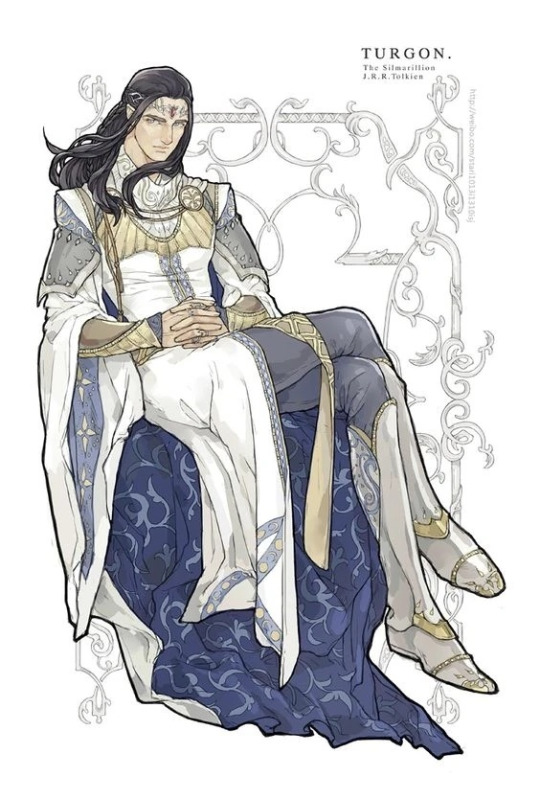
Turgon by _star热爱生活呀巴扎嘿
Eöl just stands silently for several minutes. You could cut the tension with a knife. Then, in a sudden motion, he takes a javelin that he had concealed in his cloak and throws it straight at Maeglin. If he’s gonna die there, he’s taking Maeglin with him. Aredhel jumps in front of her son, and the javelin hits her in the shoulder.
Eöl is instantly beset by guards, who bind him and lead him away. Maeglin is just silent through all this, not knowing how to react. Aredhel and Idril both try to convince Turgon to be merciful during Eöl’s trial, but that night, Aredhel dies. The tip of the javelin was poisoned. Therefore, Turgon shows Eöl no mercy. He sentences him to die by being thrown from the top of the tower. As he falls, he curses Maeglin to have all his efforts fail and to suffer the same fate.
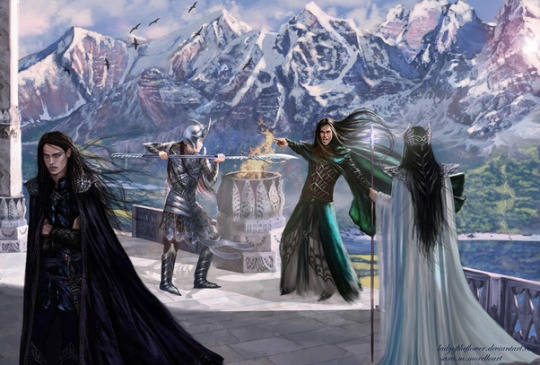
Caragdur - the same fate by SaMo-art
Most of the people of Gondolin believe justice has been served, but Idril is troubled. From that day onward, she distrusts Maeglin.
For the time being, Maeglin’s life is good. He rises through the ranks of Turgon’s court, and Turgon favors him. He finds many valuable metals in the mountains around Gondolin, and forges powerful steel weapons for the people of Gondolin. Maeglin is also wise, tough, and valiant in battle, making him a true asset to Gondolin. All is well… for now.
The only problem is that he’s still in love with Idril, who’s his first cousin. The Noldor don’t marry their cousins, and until now, none of them have wanted to. Idril also doesn’t love him; she can’t help but associate him with his insane father, and she thinks there’s a darkness in him. Somehow, he’s affected by the Curse. Slowly, Maeglin’s love for Idril festers into resentment. I’m sure that won’t cause any problems down the line.
Chapter 17: Of the Coming of Men into the West In which the Men finally arrive in Beleriand.
It’s been three hundred years since the Noldor first arrived in Beleriand. One day, Finrod Felagund is out exploring the countryside, and he sees cheery campfires and hears the sound of singing. That’s weird, he thinks, the Green Elves who live here don’t light campfires or sing at night. He worries that they might be Orcs, and sneaks closer, but he doesn’t recognize their language. They’re humans, the first Men to enter Beleriand. These Men are the people of Bëor the Old, and they’re singing because they believe that they’ve finally found a paradisal land without fear of Morgoth. Finrod finds them endearing.
When they go to sleep, Finrod sneaks further into their camp, picks up a crudely-carven harp, and begins to play. The Men wake up and are spellbound by the beauty of the faerie king’s music. Finrod sings about the creation of the world, and about Valinor. Although the Men don’t understand his language, images of what he’s singing appear in their minds, and so they learn about how the world was created.
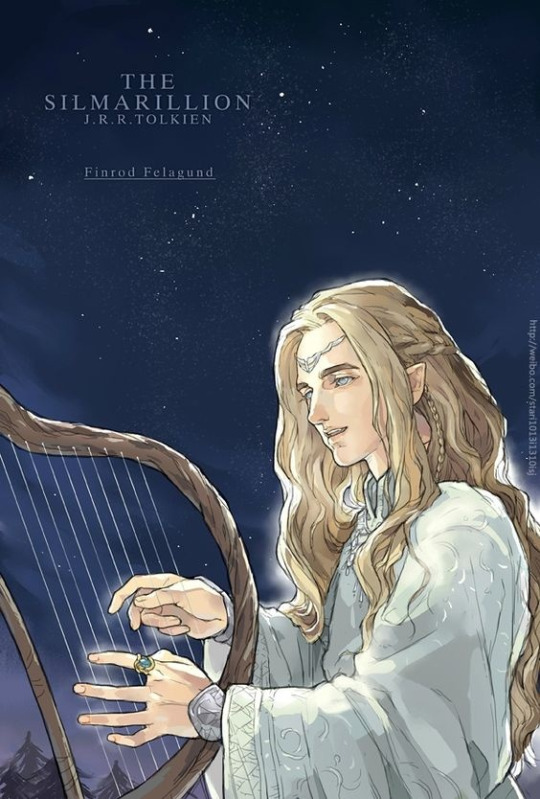
By _star热爱生活呀巴扎嘿
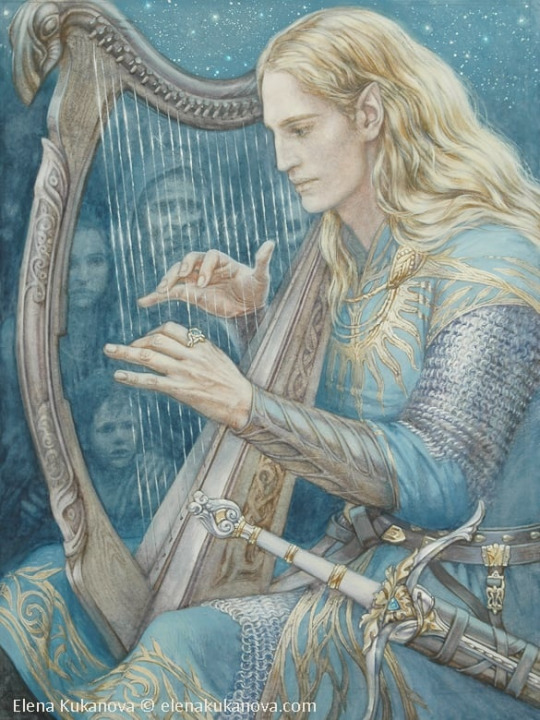
By Elena Kukanova
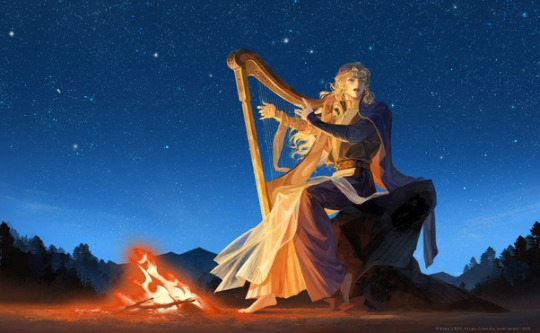
By pan_brooke
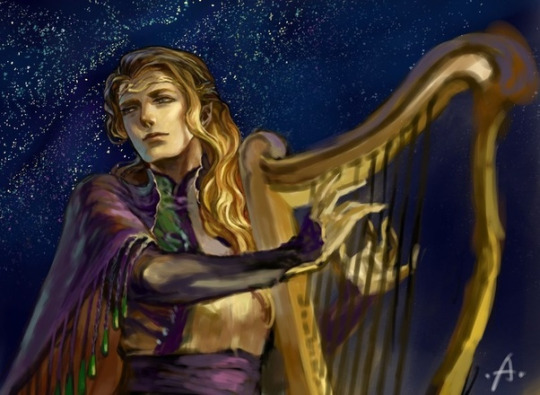
By @pansen1802
(I couldn’t pick just one image for this scene. There are so many good ones!)
After all the Elf Drama that we’ve had to sit through, it’s easy to forget what the Elves really are. They’re the Fair Folk. This scene really speaks to their folkloric roots.
At first, the Men think that Finrod is a Vala, which they’ve heard of. Finrod decides to stay with the Men for some time, in order to teach them things. They call him Nómin, which in their language means “the Wise.” Finrod can understand the Men’s speech realtively easily, because he can read their minds, and because they learned how to speak from the Dark Elves (the Avari) in the east. (This is important because it means that all of the Children of Ilúvatar’s languages descend from the original language of the Elves. It’s the Proto-Indo-European of Middle-earth.)
Finrod asks Bëor why the Men are there. Bëor doesn’t really know, because Men have short lives, and it’s taken many generations for them to get this far. Whatever it was they were fleeing in the first place, it was bad, and they’ve heard enough about Valinor to know that there’s Light in the west. Morgoth did something to corrupt them, as he always does. In fact, as soon as Men arrived in Middle-earth, Morgoth considered this such a big deal that he abandoned the war in Beleriand, putting Sauron in charge of it. Morgoth immediately went to go mess with the Men. Therefore, there’s some human equivalent of the Noldor’s Original Sin of kinslaying. But what it is, no one knows. Bëor tells Finrod that there are more Men heading westwards.
Some of the Green Elves send messengers to Finrod to ask about the Men. They’re not happy that these refugees of an unknown race are moving onto their land. They consider Men their enemies, because the Men cut down trees and kill animals. They tell Finrod to tell the Men to either go back the way they came, or move forward.
Finrod advises the Men to keep moving. They head further West, so that they’re just east of Doriath and just south of Eöl’s dark forest. This is the land that Amrod and Amras, the twin sons of Fëanor, rule over. This land is now called Estolad, “Encampment.” By that point, a year has passed since Finrod first found the Men, and he decides to return home to his own palace, Nargothrond. Bëor begs to come with him and serve him, so he does, leaving his son in charge of the Men.
Soon after, more groups of Men make their way into Beleriand. They settle in whatever little niches they can find amongst the lands that the Elves had divided up amongst themselves. The Elves are extremely interested in the Men, whom they call Edain, “the Second People.” Both Noldor and Sindar alike go to see them. They send messengers to welcome the Men, and some of the Men go to serve in the courts of the Elven kings. Overtime, more and more of them go to serve the Elves.
Thingol, however, is unhappy about the coming of Men. He already was not pleased about the arrival of the Noldor in his lands, even before he found out that they were kinslayers and banned their language. Now, a whole separate group of refugees is invading his kingdom from the other direction, dividing it into even smaller portions. What’s worse, he keeps having troubling dreams about them. The only person he’s willing to talk to about this is Finrod. Thingol decrees that the Men are only allowed to live in the north of Beleriand, and that the Elf lords that they serve are responsible for them. None of the Men are allowed to come into Doriath.
Melian knows that the arrival of Men means that big changes are coming. She whispers to Galadriel that one of the Men will eventually break through her magic wall, because the power of that Man’s destiny will overcome her own. People will sing about that event until the distant future, when Middle-earth is unrecognizable.
Many of the Men are still interested in getting to Valinor, so they can live with the Gods. They’re frustrated and disappointed to know that Valinor is even further west, across the sea. The only God that’s there with them is Morgoth, the Lord of the Dark. (This echoes the Christian idea that God is removed from the world, while Satan is here on earth with us and troubles us while we’re alive.) The Men basically have two options: to try to get across the sea to Valinor, or to try to help the Elves defeat Morgoth.
One Man, Amlach, makes the bold suggestion that there is no Valinor, and that the Elves have been lying to them. The Men have no proof that the Gods exist, and they don’t even have any proof that Morgoth exists beyond the vague evil that their great-grandfathers fled. Maybe it’s the Elves and not Morgoth who want to take over the world! Sound familiar? These are basically all the same conspiracy theories that drove the Noldor out of Valinor.
It’s darkly telling that the source of evil in The Silmarillion is conspiracy theories, lies, misunderstandings, and miscommunications. Morgoth didn’t force the Noldor to kill their relatives — they did that on their own. Now, he’s trying the same tactic all over again with the Men. All he needs to do is sew distrust amongst the people, so that they’ll attack each other instead of him, and destroy everything in the process. This speaks to Tolkien’s general theme about the power of language, but it also seems particularly poignant right now.
Morgoth’s not done yet, though. Despite his best efforts to sew distrust, the friendship between Elves and Men still holds. He decides to try a more direct approach, and sends Orcs to attack a group of Men. The Men are a lot weaker against the Orcs than the Elves are, and they barely survive the siege. Caranthir arrives with the cavalry at the last minute to drive back the Orcs. Caranthir offers the Men protection in his lands in the north. Their leader, Haleth, refuses; she doesn’t want to live under someone else’s rule. She tells Caranthir that she’d rather go further west. She gathers what’s left of her people, and brings them to Estolad.
Haleth leads her people further and further west. They travel through the land north of Doriath, the same poisonous land where Aredhel originally got lost. Many of her people die, and the survivors regret making the journey, but it’s too late to go back now. She tries to restore their way of life best she can.
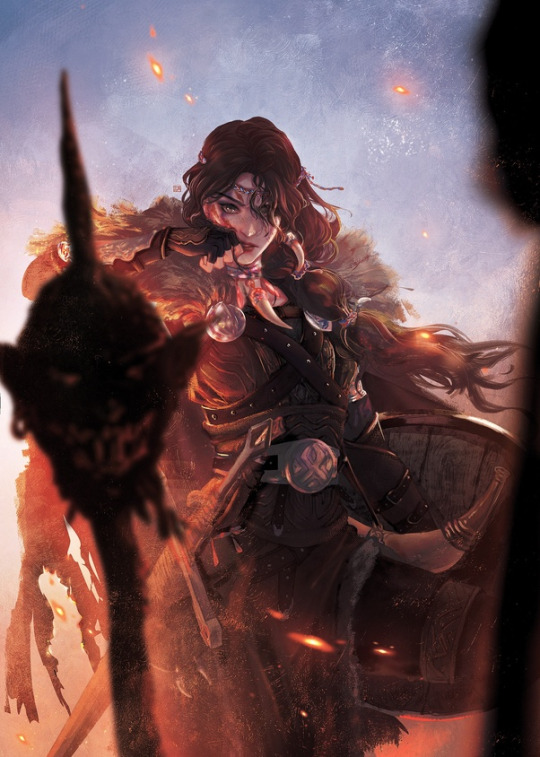
Haleth by @yidanyuan
Now, Haleth and her people are living in a forest called Brethil, northwest of Doriath. This is too close for Thingol’s comfort. Finrod vouches for Haleth and her people, and tells Thingol about the hell that they went through. Thingol reluctantly permits them to live in the forest, so long as they remain outside the magic wall and help defend the forest from Orcs. He worries that the Men and Orcs could become allies and try to attack Doriath. Haleth is disturbed that Thingol would let that thought cross his mind; why would she ally herself with Orcs, after Orcs laid siege to her village and killed her father and brother? If Thingol wants her to kill Orcs, he doesn’t need to tell her twice. She remains in Brethil until she dies, at which point her people build a great barrow for her.
Overtime, the Men learn Sindarin. They remain enthralled by the Elves, and want to learn as much of their lore as possible. But the Elves recognize that Men need to have kingdoms and leaders of their own. The different ethnic groups of Men are therefore given their own lands by the Elven Kings. In addition to Haleth and her people, there are two other important kings of Men:
One of the kings of Men is Hador Lórindol (“Goldenhead”), a member of Fingolfin’s court, whom Fingolfin is fond of. Hador’s people speak both Sindarin and their own language, which eventually evolves into the language of Númenor (which in turn evolves into Westron, the in-universe language that The Lord of the Rings and The Hobbit are written in, rendered as Modern English by our good Professor Tolkien). One of Hador’s sons is named Galdor. Galdor has two sons, Hurin and Huor. They each have a son — Húrin’s son is Túrin, and Huor’s son is Tuor. Tuor has a son, Earendil, whose name should ring a bell. Húrin, Huor, Túrin, and Tuor are all going to be important characters going forward in The Silmarillion. Earendil is the father of Elrond and his brother Elros, and much further down the line, Aragorn will be born from his lineage.
The other important king of Men is Boromir — no, not that one, this one is the son of Bëor the Old. One of his great-great-grandchildren is Morwen, the mother of Túrin, and another one of his great-great-grandchildren is Rían, the mother of Tuor. A third great-great-grandchild is Beren, who’s also a significant character going forward, and his daughter becomes the wife of Earendil, therefore the many-times-great-grandmother of Aragorn.
TL;DR: These two important kings’ grandchildren will marry each other, and their descendants will be the Kings of Numenor, whose line will eventually end with Aragorn. This is where it starts. Also, most of these great-grandchildren are about to become relevant here in the Silm.
Bëor is the first of the Men to die of old age, rather than being killed in battle. The Men are struck by their own mortality. They’re not just vulnerable to being killed — unlike the Elves, they actually have an expiration date. The scope of Men’s lives is barely a hundred years. In the First Age, the Men are practically mayflies. They also have no idea where they go when they die.
Still, the Men that settled in Beleriand are vastly superior to the Men that remained in the East, because they had the opportunity to learn skills, lore, and craftsmanship from the Elves. Also, the men are elevated somewhat just from having seen the Elves’ beautiful faces, because the Elves saw Valinor. Even secondhand, the light of Valinor is just that powerful.
#the silmarillion#the silm#the silm fandom#the silm art#silmarillion#summary#j r r tolkien#the lord of the rings#lotr#finrod#finrod felagund#eol#maeglin#haleth#curufin#celegorm#turgon#aredhel#tolkien#middle earth#elves#tolkien elves#silm elves#beleriand
27 notes
·
View notes
Text
SILMARILLION HEADCANON
So, I had this headcanon in mind since a while.
We know that after the War of Wrath and the drowning of Beleriand in 587 F.A., there nothing left of Beleriand excepted Tol-Fuin (what is left of the mounys in the south-west of Dorthonion), now know as Tol-Fuin, and Himring, now known as Tol-Himring (south Lothlann in the march of Maedhros). The two becoming islands next to each other o, the Belegaer Ocean.
What if Maedhros were still alive and still living in Himring?
At the end of the War of Wrath when Eonwë had retrieved the Silmarils, Maedhros, forced by the oath, try to take them back. However, with all the massacres and other horrors he took part in, he has become, like Melkor, unworthy of the jewels that burn deeply his remaining hand the moment he takes them. But instead of throwing himself with one of the Silmarils in the depths of the earth, he just throw the jewel in. For his part, Maglor, who was with him all along did likewise but in the Ocean, burning his hand in the process, like his brother.
After that, Maedhros exiled himself away from the elven kind and his family, unable to returning in Aman (the oath isn’t sulfilled so he can’t go back home, and he can’t confront thse whose lives he has ruined with his family). Unwiling to live among the elves in Middle Earth and other intelligent creatures, he went in exile in Himring, his fortress, renamed Tol-Himring. Far from others.
I like the idea of Maedhros living completely alone on his island with some animals as the only company he accept, slowly fading away but refusing to die (he doesn’t deserve this luxury in his mind).
#tolkien#silmarillion#the silmarillion#lotr#elves#jrr tolkien#maedhros#maglor#nelyafinwe#maitimo#russandol#headcannons#silm headcanons#silmarils#maedhros headcannons#silmarillion headcanon
43 notes
·
View notes
Text
Writing Year Wrapped (2023)
thanks for the tag @sallysavestheday
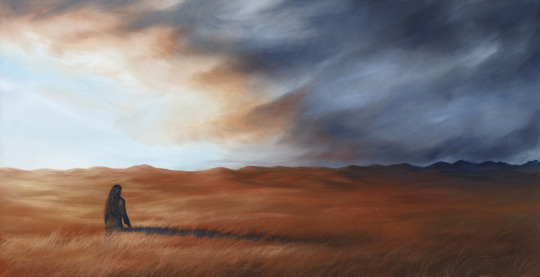
3 Favorite Fics You've Written This Year
Red - a return to my favorite relationship of all times, Fingon/Maedhros after a semi-hiatus. I let myself feel more than think while writing this, and let the words turn into a painting. Thanks to @helyannis for making that painting come true (see above).
What Lies Beyond the End - the giving up of the Silmaril by Maglor has been and still is one of the most impactful moments for me in the Silm. The writing of this ficlet was a gloriously cathartic music-high.
To Find a Home in the Twilight - Aredhel! All about Aredhel and her contagious sense of freedom. I went wild with the worldbuilding here and dug into characters that are blank slates in canon. Thanks to @toastedbuckwheat for supplying art inspiration.
3 Fics That Stretched You the Most
Against His Wisdom - this was a personal challenge to convince my brain to accept a topic I found extremely challenging for a long time. I also really got my hands dirty with elven psychology and dug into Fingon and Fingolfin's complicated characters. Thanks to @polutrope and @ettelene for the encouragment.
The Seven Trials of Fingon the Valiant - this was a sweet challenge in learning how to co-write with someone else. I am a chaotic writer, I feel as I go, I let stories write themselves. I learned a thing or two about planning ahead and writing in order with @polutrope.
Character Biography: Húrin Thalion and Part 2 - these are not fics but reference works, but putting them here because it was a long labor. A deep dive into canon to look at the evolution of Húrin's character and a critical analysis of the themes and symbology surrounding his character. (also: 11.5k words for this stingy writer!). Thanks to @dawnfelagund for the support.
3 Favorite Lines You've Written (loosely interpreting "lines")
I'm taking quotes from landscape writing because it was very enjoyable this year.
From Voices That Were Once Ours
The hills of Himring stay to the west, and the plains unfold. Lothlann makes an uncomfortable flatness, naked and exposed. The Iron Mountains rise in the far distance and interrupt the seemingly endless sky. In the light of day, they seem almost fair, and for a brief moment, Finrod believes they are not the work of violence.
From What Lies Beyond the End
The jewel illuminates the liquid space around it, calling all life to itself. Sea creatures, enormous and minute, come to offer their welcome, spiraling in a meditative dance around its brilliant streaks. Even the seagrasses reach their slim fingers with such longing they all but detach themselves from the corral that nurtures them to grasp but a strand of light. It is a silent spectacle of marvel and dread, like the sight of an erupting mountain seen from a great distance. A convergence that perhaps should never be allowed to happen upon Arda, of Sea and Sky, of profound darkness and starlight. In that fleeting instant, Maglor comes to believe that for this alone, it was all worth it.
From Red
On the rare occasions when Fingon allows himself to think of Beleriand, one image takes shape in his mind’s eye above all others. The last moments of sunset spilling down the prairies of Ard-galen. If one was to wait for the exact hour and find just the right angle, its hue matched to perfection the color of Maedhros’ tresses under bright daylight. The dark reds coming alive with the gentle swaying of tall grasses in the breeze, Fingon would wade between them with his palms spread open and believe that a beloved braid was untangling between his fingers.
3 Characters You Enjoyed Writing (that surprised you)
Caranthir in The Seven Trials of Fingon the Valiant
Galadriel in crowned with the Sun
Zimrahin Meldis in To Find a Home in the Twilight
3 Unexpected Inspirations
The Left Hand of Darkness by Ursula Le Guin. This book left me reeling. Thanks to @searchingforserendipity25 for convincing me to finally read it. The Helcaraxë will never be the same after this.
Age of Empires, yes, the game. Fantastic outlet to let me plan and imagine all my battle-writing, military formations, units, etc.
Paul M. Barford' The Early Slavs: Culture and Society in Early Medieval Eastern Europe. It helped me think deeply about the relationship between the Edain and the Elven lords in Beleriand.
3 WIPs You're Excited About in the Upcoming Year
Fingon's Kingship long fic - Fingon-centric exploration of the period between Galdor's death and the Union of Maedhros. Focused on Fingon's relationship with Círdan, Húrin, Maedhros, and Maglor.
One Thousand Days - a ficlet for Maedhros & Maglor week exploring their relationship with the Esterlings.
Scion of Kings - looking forward to finishing this Fin-galad story inspired by art pieces by @ruiniel @welcomingdisaster and @searchingforserendipity25
3 People Tagged to Share Theirs
no pressure tag to share if you'd like @searchingforserendipity25 @imakemywings @theghostinthemargins
36 notes
·
View notes
Note
‘For being someone you hate, I’m sure on your mind a lot’ with melkor and maitimo in Arda remade if you still are into that ship?!
&. 𝐫𝐢𝐯𝐚𝐥𝐬 (𝐭𝐨 𝐥𝐨𝐯𝐞𝐫𝐬?) 𝐬𝐞𝐧𝐭𝐞𝐧𝐜𝐞 𝐬𝐭𝐚𝐫𝐭𝐞𝐫𝐬.
Context: [Red]
Maedhros himself awake to the half-dark of his Lord's Chambers in Himring, and for a second his eyes register nothing but a flat, dark gray world that only slowly focuses as his mind catches up with the waking. Sleeping with one's eyes open is a very interesting thing, instinct rewiring itself from the moment the elves had returned to Beleriand. The short-lived summers of the Lothlann tundra are coming to an end, and the days are shortening again. Maedhros rouses, pauses for a moment in bed, and by his internal reckoning he supposes it is around two in the morning.
He slips out of bed, and he wears a fur coat over his sleeping clothes. He takes a freshly-lit candle and he makes his way to his study, which is just an interconnecting room. Here, he lights five more candles.
If sleep is proving to be futile, let it not stop him from being productive.
He sits in his chair and peers over the last of the papers he abandoned last night before he retired. Correspondences from Hithlum, Dorthonion, Himlad, Nargothrond and Thargelion. Last spring, the High King had sent a coded letter to the Noldorin realms. If Maedhros's approximations were correct, Fingolfin was planning an all-out assault on Angband. The tone of the letters said as much, and the implication could be found in the inquiry after the resources of the Noldor, particularly the state of wealth in Thargelion and Nargothrond.
Maedhros runs his left hand absently through his red hair as he lets his eyes roam over the Tengwar letters written on the parchment. The resources are no problem. Maedhros knows that the East alone can sustain a siege for a long time-- the real question of the utmost importance is if the Noldor can surround Angband at all.
There are no maps of the Ered Engrin, and knowledge of the terrain is crucial. Maedhros does not delude himself that only very few elves will want to be under the cold and ice of the north, though the Noldor possess high courage boundless, because--
He pauses. As he watches, the candle nearest him begins to lose color, starting from the jumping edge of the flame burning the wick, and this grayness spreads quicker than thought, and before Maedhros can straighten in his chair, all color has faded from the world, and the flames in the hearth and on the candlewicks have frozen in a timestop.
Bollocks, Maedhros thinks, and he flicks his left hand and a dagger slides into place in his hand as he braces himself. The headache comes. It always does. As does the creeping cold. For this instance, it comes from behind him.
"For being someone you hate, I'm sure on your mind a lot."
It takes near all of Maedhros's mental strength to brace against the raw hurt. He briefly shuts his eyes, and only slowly opens them. His instincts are screaming, the tiny hairs by his nape prickling up. Behind him. Yet, he stops himself from making any reckless movements. He stays absolutely still.
Darkness from his left periph, moving to stand before him. Maedhros grips his dagger. Still he says naught.
"That's interesting, isn't it, Maitimo? Would you agree to an attack on Angband?"
He strives to think of nothing, even if it be futile. Maedhros lifts his silver-gray eyes, and he attacks-- stabbing the dagger blade right toward Melkor's face.
Of course, predictably, the Vala simply catches him by the wrist. Pain explodes from his wrist, and he drops the weapon, useless. Amusement shines from Melkor's eyes.
"Now, now, that's very rude."
To Maedhros's surprise, he is let go. He follows Melkor with his gaze, not daring to sit back down. The Vala paces around his study, picking up little knick-knacks. Then he pauses by a map of Beleriand.
"You know you can't take a post of command in that attack, Maitimo," Melkor continues. "That would be....hilarious, to begin with."
The Lord of Himring says naught. Because it is true. He can't continue with the charade, if the assault pushes through. He would lead them all to disaster. Would serve all the Noldorin forces on a silver platter, to Morgoth.
Melkor gives him a final smile. "Good boy. Then you know what you have to do, hmm?"
A blink.
The world has regained all its color, and time moves again. Maedhros releases the breath he has been holding, and he slumps to the floor.
Yes. It's true. He knows what he has to do.
@spiritofwhitefire
11 notes
·
View notes
Text
reading oathbringer rn and i really want to plonk blackthorn dalinar (plus assorted buddies) into lothlann with gap commander maglor to see what happens
#not art#silm adjacent#dalinar kholin#stormlight archive#finally getting around to the series!#its pretty fun and light/easy to follow#although 'teleb' and 'oroden' are infuriatingly knockoff-sindarin names lol#but yeah reading the flashbacks and thinking about these disaster depression warlords whose job is basically just#running around conquering stuff for their more politically-inclined elder brothers#they have a very different set of stuff wrong with each of them but somehow arrived at approximately the same point#also im working on maglorath so lots of gap commander maglor thoughts rn#especially the findekano/kanafinwe name parallel and the interpretations of both his names#he's the kindest of the feanorians and he was the one who slew uldor for his betrayal#he was the first to adopt e&e but he never went to look for elured and elurin#hes famous for his laments and yet he fought in every kinslaying#hes the Mighty Singer and also just the Mighty. strong voice and commander. gold cleaver.#anyways idk whats wrong with dalinar at this point but its certainly Something#and the result of that Something looks a lot like maglor slaughtering his way through the first age#because somebody started a kinslaying and his loyalty outweighs his misgivings
5 notes
·
View notes
Text
Mammals of Maglor’s Gap and Lothlann
Now that I’ve finished world building posts on birds for each Fëanorian realm pre Amon Ereb, I’m going through mammals next! Mammals of the March of Maedhros can be found here and my environmental world building Masterlist is here!
Maglor’s Gap was the widest break in the mountains and cliffs dividing Beleriand and the lands to the north. It lay between the blue mountains to the east and the March of Maedhros to the west. Lothlann was a wide expanse of plains to the north of the Gap. The rivers greater and little Gelion ran around the western and eastern borders.
Forest steppes: wild goat, wood bison, southern white breasted hedgehog, gray marmot, ground squirrel, dormouse, woolly hares, long eared hedgehog, gray shrews, northern hog badger, sable (rare), steppe mouse, lesser noctule (bat), wildcat, red fox, red deer
Bordering mountain fences: Caucasian Tur, mouflon, chamois, alpine pika, pond bat, marbled polecat, saiga antelope, steppe polecat, mountain weasel, ibex (rare), argali
Plains: goitered gazelle, steppe wolf, wild horse, northern water vole (by the rivers), snow vole, grey dwarf hamster, common hare, common rabbit, striped field mouse, ural field mouse, harvest mouse, mountain hare, field vole (also primarily by rivers), wild horse
World building notes:
The horse based cavalry of Maglor is one of the few details we have about this region. I headcanon that the horses in question are a mixture of the descendants of the Valinor born horses brought by the Fëanorian host as well as wild horses from Estolad, Himlad, Lothlann and the other plains regions of Eastern Beleriand.
Sheep and goats provide the majority of milk and cheese products in the Gap. Some of these species are imported from other regions like sheep from Thargelion.
Domesticated bovine are rare in Eastern Beleriand outside Thargelion and parts of Estolad. There are however wild and semi domesticated bison such as the wood bison, especially on the borders of forested and forest steppe regions. Fur, skin and bones from bison are used by both Noldorin and Avarin elves for clothing and other materials.
Wild hamsters, rabbits, hares and voles were used by a select few of Maglor’s cavalry as companions and even spies.
A regiment of foot based scouts had the sigil of a hare in the form of a light silhouette upon a black background.
55 notes
·
View notes
Note
Ooh can I ask Time After Time for the rebirthed Maedhros AU? Maybe for a couple of years after the Darkening? I need to know what happens when they all get to Beleriand 👀
Okay, let's see, where were we...
Ah, yes, Mass Exodus of Elves 2: Logistics Boogaloo.
So Olwë and the Falmari have the means to get people to Beleriand, awesome! Small problem; they cannot ferry three cities worth of angry elves in one go, that's just not possible. Luckily, the Valar are not forbidden from helping. Since Ulmo is a bro, and the Helcaraxë does need to be broken up to close that path into Aman, he breaks off large flat shelves to ferry some of the elves over too.
They don't know what they're walking into over there, so it's decided, since the ice ferry is quicker, the first ice ferry elves will be primarily warriors and scouts, packed to move quickly and efficiently. The ships will follow up with more supplies and the kind of forces necessary to set up long term.
Ingwë elects to take the ice ferry. He is their highest ranking king, they'll need him for diplomacy.
Ulmo drops them off in the Falas where he can vouch for them to Círdan. Angband's invasion has not yet reached south enough to siege the Falas, but they're not so far away either.
Ingwë's forces are timely, and well armed, and Ulmo keeps them coming. They fend off the orc armies before they even touch the Twin Cities.
Such ardent resistance in the south-west draws attention. Orcs spilling from the Fens of Serech that would otherwise march around the borders of the Girdle turn instead to contend with the mixed Kindred army marching under the banner of the King of All Elves. It's not a great amount of relief to Elu Thingol's army, but it is enough relief they can march that much quicker, have just fewer foes to contend with, that Elu Thingol can just barely make it in time to save Denethor, King of the Laiquendi.
Elu Thingol has no time for pleasantries. He is surrounded. He stuffs Denethor, and as many of the Laiquendi as are willing, under his arm and hauls ass back to the Girdle.
The ships, sped along by Ulmo and Manwë, hit the shores of Lammoth and Arvernien. Finwë in the north. Olwë in the south.
Finwë marches his forces up the Firth of Drengist, fighting every step of the way to clear Hithlum and plug the passes, securing an alliance with the hard pressed Mithrim Sindar. His success lets Ingwë make decent headway into Talath Dirnen and the riverlands between the forests of Brethil and the Ered Wethrin.
Meanwhile, Olwë is clearing out the coast from the cape of Balar to the estuary of Sirion, splitting his forces around the forest of Nan Tathren to pin the orcs against the wall of the Andram. They follow the Andram east to the Ramdol where Amon Ereb can be seen in the distance.
With Finwë and Ingwë plugging the Fens, the exhausted Iathrim finally get enough breathing room to take back Dimbar and make headway in Dor Dinen. Not even orcs willingly trespass in Nan Dungortheb.
With Finwë taking the brunt of the frontal siege in Ard-Galen, Ingwë spills his forces through the arc of Dorthonion, clearing out the orcs. Eventually they emerge in Ladros and start the slog of closing the pass of Aglon.
The Iathrim take back Dor Dinen, and start securing the passes of the river Arossiach. Forays are made into Himlad to get Nan Elmoth back. Down south, Olwë chases orcs up through Estolad, freeing up the river passes into Ossiriand and winning friendship with the Laiquendi along the way. The plains of east Beleriand are wide and easy to travel. Eventually they pin the orcs between the Celon and the Little Gelion, forcing them through the craggy hills of Himring.
Ingwë and Olwë meet in Aglon, and then Olwë goes east, into Lothlann.
Together, the three kings and their forces shove the routed armies of Angband back through the dread gates.
And that's the first Tree year in Beleriand.
Meanwhile, Elu Thingol is being pushed to his limits as a gracious host. The good news! Thanks to Melian, Denethor mended well and took his people back to Ossiriand, clearing out Thargelion along the way. The bad news. There are now three entire Kindreds of Calaquendi elves in the north and Elu is no longer the only of his kind. The better news! Ingwë says they only plan to stay long enough to kick Angband's ass and then they'll be out of Elu's hair eventually. The worse news. Ingwë's now calling himself the King of All Elves, which is the first Elu's ever heard of it.
He didn't vote for this!
At least his missing brother and his old best friend are in hugging distance again, even if they're both mercilessly calling him a heartsick swain for taking up residence in the forests where Finwë used to live.
Elu takes back missing them. They can fuck off again.
And thus, the Leaguer is established with Ingwë and Ingwion in Hithlum (bc otherwise Ingwë gives Elu 'and no other above me' Thingol raging hives), Finwë takes Himring, Olwë takes the Bay of Balar, and the three of them spread their multiple sons out elsewhere in the gaps.
Also, Russingon have a threesome with Denethor, but that's another matter.
28 notes
·
View notes
Text


Names and Titles: Caranthir Feanorion, Carnistir Morifinwë, Lord of Thargelion, The Dark Finwë
D.O.B: Between Y.T. 1190 and 1362
Death: F.A. 505
Height: 7’8”
Eyes: Silver grey
Hair: Black
Notable features: Red birthmark on face, vibrant blush, lots of freckles, resting bitch face
Realm: Thargelion {F.A. 7 - 455}

Caranthir, the fourth of the Sons of Fëanor, was also the harshest and the quickest to anger. He was known as "Caranthir the Dark".
As with the other Sons of Fëanor, Caranthir was bound by the Oath of Fëanor to recover his father's Silmarils, which had been stolen by the Dark Lord Morgoth. This oath brought the Noldor to Middle-earth near the end of the First Age. Angrod of the House of Finarfin was the first messenger of the Noldor to come to King Thingol who gave his permission to the Noldor to dwell in some free lands, but not in Doriath, as he considered himself Lord of Beleriand. Maedhros laughed at Thingol's claims, remarking that Thingol had merely given them lands in which he had no power. But Caranthir despised the children of Finarfin, and spoke in anger against Angrod, saying that he ought not to have been the spokesperson of the Noldor. Maedhros rebuked him, but division between Noldor increased after the outburst.
The people of Caranthir went to the furthermost East Beleriand, reaching Ered Luin, and there they became the first of Noldor to encounter the Dwarves. Caranthir disliked the Dwarves for their unloveliness, but though there was little love between the two peoples, they allied against their common enemy: Morgoth. The alliance brought great profit, for all the trading that came to Beleriand from the Dwarves went first through Caranthir's hands, and he gained great wealth.[3] Caranthir's realm was in Thargelion, and was sometimes called Dor Caranthir ("Land of Caranthir"). His abode was on the shores of Lake Helevorn.
In F.A. 375, Caranthir rescued Haleth and her people, the Haladin, when they were besieged by Orcs. At last recognizing the valour of Men, he offered the Haladin a fiefdom in his lands to the North. However, Haleth's heart was proud, and wanting her people to serve no lord she thanked him but removed to the Forest of Brethil.
In F.A. 455, Thargelion was utterly ruined by the Dagor Bragollach and Caranthir & his people were forced to retreat. They joined the scattered folk of Amrod and Amras. They fled to the south and maintained a watch upon Amon Ereb, aided by the Laegil. In F.A. 463, the Easterling Ulfang led his people over the Blue Mountains, and they allied themselves with Maedhros. They swore allegiance to Caranthir, whom they followed, and were given land in Lothlann. In F.A. 472, the disaster of the Nirnaeth Arnoediad ("Battle of Unnumbered Tears") occurred, caused by the betrayal of the people of Ulfang, and the sons of Fëanor were scattered.
In F.A. 505, Caranthir perished along with his brothers Celegorm and Curufin during the Second Kinslaying, the attack by the Sons of Fëanor on Menegroth in an attempt to recover a Silmaril from King Dior Eluchíl of Doriath.

Survival Verse
Morifinwiel Verse
Expanded Family Verse
Halenthir Verse
0 notes
Text
of peace and tits
read it on the AO3 at https://ift.tt/t9hq0HK
by Dalliansss
One summer at the Lothlann tundra, Bór takes some elven lords riding upon the back of his annabon.
Words: 617, Chapters: 1/1, Language: English
Fandoms: The Silmarillion and other histories of Middle-Earth - J. R. R. Tolkien, TOLKIEN J. R. R. - Works & Related Fandoms
Rating: Teen And Up Audiences
Warnings: No Archive Warnings Apply
Categories: Gen
Characters: Bór the Faithful, Maedhros | Maitimo, Finrod Felagund | Findaráto, Maglor | Makalaurë
Additional Tags: Slice of Life, Humor, someone keep Finrod and Maglor away from the gd milk-wine, Wine, Raucous Ditties courtesy of Edain
read it on the AO3 at https://ift.tt/t9hq0HK
0 notes
Text
FOR THE RECORD:
Maglor - could legitimately work as a happy(ish) marriage. Like with her canon beaus (and the whole House of Finwë tbh), she’s attracted to his unstoppable dedication to his pursuits, and vice versa; as well as (like Maedhros) Oath-bound Maglor sees Celechwes’s innate sense of freedom and wants to share in it. For practical politics, she accurately IDs him as the sanest of the more insane half of the Noldor high command, and wants to lock that down. And goodness knows that of all the official Siege-line territories, she’d be happiest as Lady of Lothlann Fields! In this au, Celechwes most likely dies in Dagor Bragollach—not because she couldn’t outrun the dragons but because she kept circling back to get others to safety.
Celegorm - drunken, hopeful sex at Mereth Aderthad (the Feast of Reuniting). She admits to him that she and another Falathrin scout, since slain, followed the orcs north and watched the Battle-under-Stars from a tree on a distant hill, and spent the whole journey back to the shore debating whether he and Huan were both Maiar, or neither was. Ultimately, this knowledge makes Celegorm worse.
Caranthir - it just couldn’t happen, I’m sorry. They get along, but only for mutually satisfactorily short periods of time—a few days at most. Caranthir is very much an indoors cat, and Celechwes is very much not. That said: best team for going undercover as a fake-married couple in some sort of superhero au shenanigans; also surprisingly good bridge partners. They vibe! They just have 0 interests or preferences in common.
Curufin - Nonconsensual fake dating is the ONLY option.
"--plus one - oh, there he is!" Curufin's perfectly nice day at the Expo for Villainous Inventors and Lobbyists was interrupted by the sound and sight of a short blond woman darting away from a security guard and directly into his personal space. He recognized her, more or less, a split second before she wrapped her arms around him - Maedhros's new pet meta inspector, or at least, he was wooing her or something. He'd started to ask Curufin's R&D staff about things like "energy efficiency" and "green waste" which he clearly only understood as a politician, and Curufin suspected she was the reason. She hugged him far too intimately, and went on tiptoes to whisper in his ear, "Play along or I'll tell Phoenix about your third secret laboratory in Cambodia."
Amras - in the fic!canon timeline where Amrod dies at Losgar, could actually work, albeit decidedly non-romantic marriage. She accurately identifies him as the loosest of all these loose ballistae and decides to tie that down—and she does, because Celechwes and her love for Beleriand can give Amras a purpose for All Of This that’s been missing since Amrod died, a purpose beyond the damn Oath; and he cares a great deal, about everything, and that’s good enough for her. They are feral forest creatures together.
Amrod - turning once again to the superhero au…though, actually, I was going to say “sex pollen threesome with Ambarussa” and that could probably happen in a canon-ish timeline where Amrod survives Losgar, too. The twins are more well-adjusted in such a timeline, snd so can have non-angsty antics like this, and the Laegrim down in their territory have some wild herbs…
Turgon - late Third Age sex party hosted by Finrod. Celechwes's attempts to explain that he has many of the superficial best traits of both Fingon and Maedhros fall on Fingon covering his ears and loudly saying, "LA LA LA!"
Aredhel - HORSE GIRL BESTIES ON THE LOOSE. In an au where Aredhel doesn’t go to Gondolin, a hundred years or so into the Fingon/Celechwes/Maedhros mutual unrequited pining mess, Aredhel says, “This is ridiculous, Finno. If you aren’t going to get off your ass and seduce her, I will.” A few days later she joins Celechwes on her courier route and just…stays. Comes and goes, of course—she has her own duties, as a princess. But also, basically takes up courier duties for a few months/years just to hang out with Celechwes, because they really DO get along great! Tender but feral woods sex—not committed marriage, but not necessarily pre-meditating to make sure their souls don’t stay a little bound for a few days/weeks/months after, either! (Fingon is weeping into a pillow while listening to elf!Mitski; Maedhros is Totally Fine like always, and going out on extra patrols to kill orcs with extra violence.)
They're cutting through Nan Elmoth, or maybe actually delivering mail there, when they meet Eol together and stay the night at his hall. Aredhel is making eyes at him just as hard as he's making them at her, so she waves Celechwes off and promises to catch up later, and Celechwes agrees with a laugh. A year or three later, however, she still hasn't seen Aredhel again and now has anyone else, so - while reassuring Aredhel's family that she'd fine and just cheerfully fucking around in the wilderness somewhere! - she goes back to check in. She cannot get in. The forest of Nan Elmoth is even darker and more twisted than usual. Thrice, the trees turn Celechwes back, until she accepts the banishment and - the vibes being Not Good and the politics being potentially worse - goes to find her fourth cousin twice removed who serves with the Marchwardens, to ask for help. Unfortunately, meanwhile, Fingon has...taken the reassurances to heart, mostly, but also he wants to see his sister, and this apparent new serious suitor! So he takes a break from a diplomatic ride along the Siege-line to duck down south and also check in on Aredhel...and he also gets twice turned around and shoved out by the dark trees and twisting paths. However, he is Fingon, so the third time, he draws his sword as he plunges back in, and makes a little better headway hacking and slashing...but not much. He shouts that if he is not permitted to see his sister, he will come back with a flamethrower - at which point the forest starts actively trying to kill him, rather than just shove him out. He makes it out alive, of course, because he's Fingon. He returns no more than a week later with 20 or so soldiers from Himring + Maedhros himself, (basically a walking flamethrower). Fortunately(?), Celechwes arrives no long after with a small group of Marchwardens... Eol may or may not survive. His house DOES get burned down. Aredhel and baby Maeglin go home with Fingon, though she's a little indignant at first because from her pov the red flags had only been, like, dark orange so far.
Argon - late Second Age, shortly after Celechwes's re-embodiment, he invites her to dinner as a sister-in-law and asks her for stories of Beleriand, because he's still a little desperate to know all of what he missed. She gets drunk and weepy while telling him, and kisses him because he looks like Fingon, and for just a split second he kisses back, also pretending. Then they both pull back and apologize. Celechwes cries harder because she misses her land, Argon puts her to bed in his guest room, and she leaves in the morning without speaking to him. They never speak of it again. This might be actual fic!canon.
Finrod - threesome with Finrod and Amarië, a couple hundred years after Celechwes's re-embodiment. Possibly foursome with Elenwë also. Listen, Elenwë was already halfway to being a third in their marriage, has been since the early Second Age - she's Amarië's best friend, she's the wife of Finrod's best friend/brother who is still dead, they're more than happy to do fill some of the void in her heart until Turgon returns, and one thing Finrod definitely picked up from Men is an appreciation for casual sex. So! Here is another sister-in-law, albeit less close, but even more wounded-in-heart and needing of solace and welcome in this land that is strange for her... This really probably did happen in fic!canon.
Angrod - I haven't actually given much thought to the middle Arafinwëans...sorry, boys...also, he's married... Let's say later Third Age sex party hosted by Finrod & Amarië for him, too. And Edhellos, obviously.
Aegnor - a second solid candidate for drunken, hopeful hookup at the Mereth Aderthad. Never gonna happen after he meets Andreth, though, even if some descendant of Elros does, while passing through Mandos, convince him to return to life. He's a one-woman elf, and now she's gone.
Galadriel - Celechwes happened to be in Doriath for the party for Lúthien's [mumble]-hundredth's begetting day. Melian blessed the wine herself, with a certain amount of enchantment. This IS canon, however, neither Celechwes, Galadriel, nor anyone but Melian remembers that several-nights clearly.
I’m nearing 6,969 followers and my friend suggested (when it happens) I celebrate by taking crackship prompts, and my brain immediately began rotating Celechwes through the entire third generation of the House of Finwë one by one, wondering how each would work. So that’s where I am, tonight.
35 notes
·
View notes